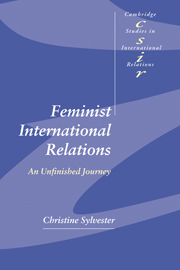Book contents
- Frontmatter
- Contents
- Acknowledgments
- Part I Introduction
- Part II Sightings
- Part III Sitings
- 8 The emperors' theories and transformations: looking at the field through feminist lenses
- 9 Feminists and realists view autonomy and obligation in international relations
- 10 Some dangers in merging feminist and peace projects
- 11 Gendered development imaginaries: shall we dance, Pygmalion?
- 12 Empathetic cooperation: a feminist method for IR
- Part IV Citings
- References
- Index
- CAMBRIDGE STUDIES IN INTERNATIONAL RELATIONS
11 - Gendered development imaginaries: shall we dance, Pygmalion?
Published online by Cambridge University Press: 22 September 2009
- Frontmatter
- Contents
- Acknowledgments
- Part I Introduction
- Part II Sightings
- Part III Sitings
- 8 The emperors' theories and transformations: looking at the field through feminist lenses
- 9 Feminists and realists view autonomy and obligation in international relations
- 10 Some dangers in merging feminist and peace projects
- 11 Gendered development imaginaries: shall we dance, Pygmalion?
- 12 Empathetic cooperation: a feminist method for IR
- Part IV Citings
- References
- Index
- CAMBRIDGE STUDIES IN INTERNATIONAL RELATIONS
Summary
In 1996 I sold house and car, packed belongings, and moved to Australia. At the National Centre for Development Studies, Australian National University (ANU), I continued my research, worked with postgraduate students from around the world, and took on development consultancies. That the move resited me topically, to some degree, as well as geospatially sent some whispers over the seas that “she has dropped out of IR.” I had a giggle at the thought. For a new landscape of international relations appeared before me, full of Asia and the Pacific, full of southern hemispheric contrariness to northern norms, and blessedly free of American self-importance.
Doing development is a spin-off of many years of research in Southern Africa. After relocating to Australia, though, I found my work taking me as much to Korea, Thailand, and Indonesia as to Zimbabwe. I watched globalization affecting places I barely knew before – Bhutan, Fiji, the Maldives, Papua New Guinea. Wandering in the spirit of a Cynthia Enloe, albeit with development dilemmas in briefcase and development critiques in my mind, I have come to wonder incessantly about the women that mainstream IR scholars still have trouble locating – at all, let alone in an international development portfolio. Gone missing in some of IR, women of these regions regularly appear in the work of ANU colleagues (e.g., Jolly and Ram, 1998; Law, 2000; Pettman, 1996a) – though Africa is disturbingly out of sight across Australian academia.
- Type
- Chapter
- Information
- Feminist International RelationsAn Unfinished Journey, pp. 224 - 241Publisher: Cambridge University PressPrint publication year: 2001



